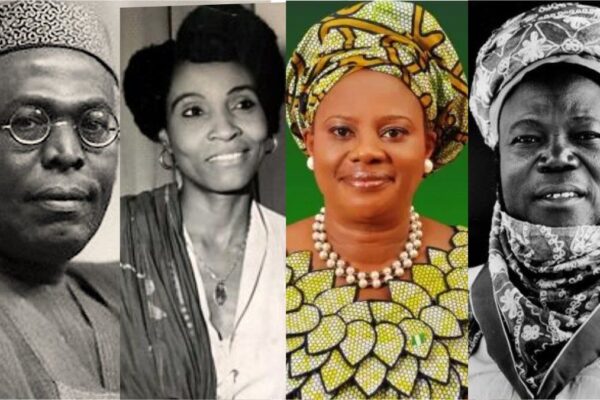Nigeria may be seen as a country with many negatives, but heroes and heroines have emerged from it. These patriotic citizens worked hard to ensure a better Nigeria where the people are free from British colonialism and free to express themselves.
Their efforts were tough, and many of them made a lot of sacrifices. Some even paid with their lives. This is why it is our civic duty to remember and honor them for their efforts to make Nigeria a better place for children, both born and unborn. Therefore, here are the top 20 Nigerian heroes and heroines and their achievements.
Top 10 Nigerian heroes and their achievements
1. Dr. Nnamdi Azikiwe
Popularly known as the “Zik of Africa” and “father of Nigerian nationalism,” Dr. Nnamdi Azikiwe was Nigeria’s first President from 1963 to 1966. He was born on November 16, 1904, in Zungeru, Northern Nigeria. However, his parents were Igbo from Anambra State. By the time he finished secondary school, he was fluent in Igbo, Hausa, and Yoruba languages due to exposure to different Nigerian cultures. This would be an asset to him as Nigeria’s first president. Before joining politics, “Zik” was the editor for the African Morning Post and established the West African Pilot. He founded the National Council of Nigeria and the Cameroons (NCNC) in 1944 alongside Herbert Macaulay and became the secretary-general of the National Council in 1946.
He was the first Nigerian to be named to the Privy Council of the United Kingdom and the Governor-General on the same day. Zik died aged 91 on May 11, 1996. But his hard work and legacy live on as many places have been named after him, including his face gracing the 500 naira note since 2001.
2. Sir Ahmadu Bello

Ahmadu Ibrahim Bello was the Sardauna of Sokoto who was knighted Sir Ahmadu Bello by the Queen of England. He was a conservative Nigerian statesman who masterminded the mordenisation and unification of the different tribes of Northern Nigeria. He became the region’s first and only premier in 1954 and played active roles in Nigeria’s independence alongside Abubakar Tafawa Balewa.
However, he was assassinated in a coup that ended Nigeria’s post-independence government on January 15, 1966. Ahmadu Bello University, Zaria is named after him and his photo graces the N200 note.
ALSO READ: 6 uncelebrated heroes and heroines that saved lives in Nigeria
3. Chief Anthony Enahoro

Chief Anthony Eromosele Enahoro was one of the foremost anti-colonial and pro-democracy activists in Nigeria. He was Nigeria’s youngest ever editor, aged 21 at Nnamdi Azikiwe’s newspaper, the Southern Nigerian Defender, Ibadan, in 1944.
Enahoro became the first to move the motion for Nigeria’s independence in 1953 which is why many academics and Nigerians named him the “Father of Nigeria State”. Although, his motion for Nigeria’s independence was unsuccessful until 1960, he will always be remembered for fighting a good cause for the nation until his death in 2010.
4. Chief Obafemi Awolowo

Chief Obafemi Awolowo was the first indigenous Premier of Western Nigeria. He was one of the first leaders to champion the cause of independence for Nigeria. Not only that, he introduced free education and health care in the western region in 1955. He founded Action Group in 1950, a party that called for the termination of British rule in Nigeria. He also founded the Yoruba nationalist group, Egbe Omo Oduduwa.
Awolowo was the first leader of Government Business and Minister of Local Government and Finance and contested for Nigeria’s presidency thrice. Although he didn’t win, he is still regarded as the leader of the Yorubas till date. He died peacefully at his Ikenne home, the Efunyela Hall, on May 9, 1987, at the age of 78. His photo adorns the N100 note.
5. Herbert Macaulay
Olayinka Herbert Samuel Heelas Badmus Macaulay was what many Nigerians regarded as the founder of Nigerian nationalism. Born on November 14, 1864, Herbert Macaulay was the grandson of Bishop Samuel Ajayi Crowther, the first Anglican Bishop of West Africa. He began the nationalist movement in the 20s after he realised that people of different backgrounds living in the British colony of Nigeria could come together as one. As a result, he founded the Lagos Daily News to promote the nationalist movement.
He also became the first Nigerian to establish a political party in 1922, the Nigerian National Democratic Party (NNDP). Herbert Macaulay was the first national president of the National Council of Nigeria and the Cameroons (NCNC), a party he co-founded with Nnamdi Azikiwe in 1944. His photo graced the now out-of-circulation N1 note and coin.
ALSO READ: Top 6 Nigerian activists of all time
6. Aminu Kano

Mallam Aminu Kano was a Nigerian Muslim politician who led a socialist movement in the northern part of the country in opposition to British rule. Known for political radicalism in the north, the Northern Elements Progressive Union (NEPU), fought against the autocratic and feudalistic actions of the Native Northern Government. His attack was targeted at the ruling elite including the emirs, who were mostly Fulanis. He advocated for the removal of ethnic barriers in the formation of political parties and was one of the first politicians who supported equal rights for women.
Mallam Aminu Kano remains a highly respected figure in Northern Nigeria despite his death and an airport, a college and a major street have been named after him. Also, the house where he lived, died and was buried has been converted into the Centre for Democratic Research and Training under the Bayero University Kano.
7. Gen. Murtala Mohammed

General Murtala Ramat Muhammed was Nigeria’s military ruler after staging a counter-coup in 1966. Although his rule was shortlived, he gave Nigeria a new sense of direction by establishing 19 states out of the 12, and set up a Public Complaints Commission which gave probity to the public. He was the first leader to introduce the phrases “Fellow Nigerians” and “with immediate effect” to the national lexicon.
Muhammed was the first to announce that the new Federal Capital would move to Abuja, a location of about 8,000 square kilometres, in the central part of the country. He was known for a simple lifestyle which eventually cost him his life when he was assassinated aged 37 alongside his aide-de-camp, Lieutenant Akintunde Akinsehinwa, in his black Mercedes Benz saloon car on February 13, 1976. The only protection he had was a pistol carried by his orderly which made his assassination very easy.
8. M.K.O Abiola

Chief Moshood Kashimawo Olawale Abiola has been regarded as the father of Nigerian democracy after he was declared the unofficial winner of the infamous June 12, 1993, presidential elections. A businessman, publisher, politician, and aristocrat of the Yoruba Egba clan, Abiola contested against National Republican Convention (NRC) candidate Bashir Tofa in what is referred to as Nigeria’s freest and fairest election till date. However, the results were annulled by the then-military Head of State General Ibrahim Babangida. Abiola continued to fight for his mandate until he unexpectedly died in prison on the day he was supposed to be released. Today, June 12 has been named Democracy Day in Nigeria.
9. Fela Anikulapo-Kuti

Fela Anikulapo-Kuti popularly known as Fela Kuti was a controversial Nigerian multi-instrumentalist, band leader, composer, political activist, and Pan-Africanist. He is widely regarded as the pioneer of Afrobeat and spoke against Nigeria’s military juntas.
Fela founded the Kalakuta Republic, which declared itself independent from military rule. As a result, he was a constant target for the military government and even spent 20 months in jail under the Muhammadu Buhari military rule. He died of alleged complications from AIDS but his music lives on through the efforts of his children.
10. Gani Fawehinmi

Chief Abdul-Ganiyu “Gani” Oyesola Fawehinmi, GCON, SAN was a civil rights lawyer and politician. He was known for his activism in the principles and ideals of the rule of law, undiluted democracy, and protection of fundamental human rights. Fawehinmi was one of the few people to reject the Order of the Federal Republic (OFR) – the highest honor given to a citizen by the Nigerian government – to protest against the many years of misrule since Nigeria’s independence.
ALSO READ: Top 10 richest politicians in Nigeria
Top 10 Nigerian heroines and their achievements
Like the men, it is also important to recognise Nigerian heroines for their contributions to the growth of the nation. Here are the top 10:
1. Funmilayo Ransome Kuti

Chief Funmilayo Ransome-Kuti, popularly known as Funmilayo Anikulapo-Kuti, was an educator, political campaigner and suffragist. She was also the mother of Fela Anikulapo-Kuti and became the first woman to drive a car in Nigeria.
2. Kudirat Abiola

Alhaja Kudirat Abiola was the second wife of M.K.O Abiola and a pro-democracy campaigner in Nigeria. She was assassinated in her fight for her husband’s June 12, 1993 mandate while he was in prison.
3. Margaret Ekpo

Margaret Ekpo was a Nigerian women’s rights activist who became the first female politician in the country’s first republic. A member of the National Council of Nigeria and the Cameroons (NCNC), she was nominated to the regional House of Chiefs in 1953. She was well known as a grassroots and nationalist politician in the Eastern Nigerian city of Aba.
4. Hajiya Sawaba

Hajiya Sawaba was a strong Nigerian politician and activist from the Northern region. She supported the Northern Elements Progressive Union (NEPU) which fought and eventually won independence for Nigeria. Despite being a woman with little education and forced into an early marriage, she fought to liberate women from African traditions that don’t favour them.
ALSO READ: Top 10 traditional rulers in Nigeria
5. Madam Tinubu

Madam Tinubu helped to abolish the slave trade in Badagry and became the first Iyalode of Egbaland.
6. Grace Eniola Soyinka

Grace Eniola Soyinka was a women’s rights activist and co-founder of Abeokuta Women’s Union with Funmilayo Ransome-Kuti, who was her aunt-in-law. The group protested against taxes introduced by the Alake of Abeokuta, the indirect ruler backed by the British colonialists. Eniola Soyinka was the mother of Wole Soyinka, Nigeria’s first and only Nobel Prize winner in Literature.
7. Chioma Ajunwa

Chioma Ajunwa is a policewoman and the first Nigerian to win gold at the Olympics in Atlanta in 1996. She is also the first black African woman to win an Olympic gold medal in a field event.
ALSO READ: Top 10 female politicians in Nigeria and the world
8. Prof. Dora Akunyili

Prof. Dora Akunyili was the Director-General of the National Agency for Food and Drug Administration and Control of Nigeria. She was known for steadily fighting against fake and sub-standard drugs during her time at NAFDAC.
9. Ngozi Okonjo-Iweala

Ngozi Okonjo-Iweala is a two-time Minister of Finance, who is known for being instrumental in writing off Nigeria’s foreign debt during her first time as Finance Minister. She is currently the Director-General of the World Trade Organization.
10. Agbani Darego

Ibiagbanidokibubo Asenite ‘Agbani’ Darego, MFR is a Nigerian model and beauty queen who won Miss World pageantry in 2001. She became the first Nigerian and black African to win the prestigious crown.










